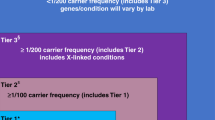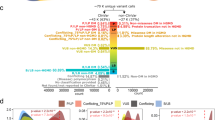Abstract
For years, clinicians have offered gene-by-gene carrier screening to patients and couples considering future pregnancy or those with an ongoing pregnancy early in gestation. Examples include ethnic-specific screening offered to Ashkenazi Jewish patients and panethnic screening for cystic fibrosis and spinal muscular atrophy. Next-generation sequencing methods now available permit screening for many more disorders with high fidelity, quick turnaround time, and lower costs. However, instituting these technologies carries with it perils that must be addressed. The basis for the selection of disorders on expanded carrier screening panels should be disclosed. The information provided about disorders with mild phenotypes, variable expression, low penetrance, and/or characterized by an adult onset should be complete and transparent, allowing patients to opt out of receiving these test results. Patients also must be made aware of the concept of residual risk following negative test results. Laboratories have a duty to participate in and facilitate this information transfer.
Genet Med 2013:15(6):482–483
Similar content being viewed by others
Main
The American College of Medical Genetics and Genomics believes that advances in genetic technology need to be considered carefully before their incorporation into routine clinical care. The organization has defined the standard of care for prenatal/preconception population carrier screening for common single-gene autosomal recessive disorders (such as cystic fibrosis and spinal muscular atrophy) and a panel of single-gene autosomal recessive conditions specifically for the Ashkenazi Jewish population. These protocols have successfully guided reproductive decision-making for millions of families.
The completion of the full human genome sequence, followed by dramatic improvement in the speed and cost of DNA sequencing and microarray hybridization analysis, has enabled the ascertainment of an unprecedented quantity of disease-specific genetic variants in a time frame suited to prenatal/preconception screening and diagnosis. Now it is possible, using new technologies, to screen for mutations in many genes for approximately the same cost as previously required to detect mutations in a single gene or a relatively small number of population-specific mutations in several genes. Commercial laboratories have begun to offer such expanded carrier screening panels to physicians and the public, but there has been no professional guidance on which disease genes and mutations to include.
The proper selection of appropriate disease-causing targets for general population-based carrier screening (i.e., absence of a family history of the disorder) should be developed using clear criteria, rather than simply including as many disorders as possible. For a particular disorder to be included in carrier screening, the following criteria should be met:
-
1. Disorders should be of a nature that most at-risk patients and their partners identified in the screening program would consider having a prenatal diagnosis to facilitate making decisions surrounding reproduction.
-
•The inclusion of disorders characterized by variable expressivity or incomplete penetrance and those known to be associated with a mild phenotype should be optional and made transparent when using these technologies for screening. This recommendation is guided by the ethical principle of nonmaleficence.
-
2. When adult-onset disorders (disorders that could affect the offspring of the individual undergoing carrier screening once the offspring reaches adult life) are included in screening panels, patients must provide consent to screening for these conditions, especially when there maybe implications for the health of the individual being screened or other family members.
-
•This recommendation follows the ethical principles of autonomy and nonmaleficence.
-
3. For each disorder, the causative gene(s), mutations, and mutation frequencies should be known in the population being tested, so that meaningful residual risk in individuals who test negative can be assessed.
-
•Laboratories should specify in their marketing literature and test results how residual risk was calculated using panethnic population data or a specific race/ethnic group.
-
•The calculation of residual risk requires knowledge of two factors: one is the carrier frequency within a population, the other is the proportion of disease-causing alleles detected using the specific testing platform. Laboratories using multiplex platforms often have limited knowledge of one or both factors. Laboratories offering expanded carrier screening should keep data prospectively and regularly report findings that allow computation of residual risk estimates for all disorders being offered. When data are inadequate, patient materials must stress that negative results should not be overinterpreted.
-
4. There must be validated clinical association between the mutation(s) detected and the severity of the disorder.
-
•Patient and provider materials must include specific citations that support inclusion of the mutations for which screening is being performed.
-
5. Compliance with the American College of Medical Genetics and Genomics Standards and Guidelines for Clinical Genetics Laboratories, including quality control and proficiency testing.
-
•Quality control should include the entire test process, including preanalytical, analytical, and postanalytical phases. Test performance characteristics should be available to patients and providers accessing testing.
A highly multiplexed approach will require a more generic consent process than is typically used for single-disease screening because it may not be practical for a clinician to discuss each disease included in a multidisease carrier screening panel. An appropriately tailored informational pamphlet or Web site, containing a brief description of each disorder included in a test panel, should be available to patients undergoing or considering an expanded prenatal/preconception carrier screening panel. Genetic counseling before testing should be available to those who desire this, and posttest genetic counseling for those with positive screening results is recommended. A recent categorization of risk denotes carrier screening as moderate risk.1 Posttest counseling should include disclosure of the mutation(s) detected, description of the clinical nature (including the natural history and management) of the disorder in question, facilitation of testing of the reproductive partner, calculation of the revised fetal risk when the partner is not available for testing or declines testing, identification of other family members at risk for the disorder, and discussion of options for fetal testing and reproductive decision-making.
Disclosure
B.H.T., A.R.G., and A.S. declare no conflict of interest. W.W.G., L.H.B., and K.G.M. direct molecular genetics laboratories that perform carrier screening. R.V.L. directs a laboratory that performs confirmatory testing and carrier screening for cystic fibrosis.
References
Monaghan KG, Benkendorf J, Cherry AM, et al. Risk categorization for oversight of laboratory-developed tests for inherited conditions. Genet Med 2013;15: 314–315.
Author information
Authors and Affiliations
Corresponding author
Rights and permissions
About this article
Cite this article
Grody, W., Thompson, B., Gregg, A. et al. ACMG position statement on prenatal/preconception expanded carrier screening. Genet Med 15, 482–483 (2013). https://doi.org/10.1038/gim.2013.47
Received:
Accepted:
Published:
Issue Date:
DOI: https://doi.org/10.1038/gim.2013.47
Keywords
This article is cited by
-
Clinical application value of expanded carrier screening in the population of childbearing age
European Journal of Medical Research (2023)
-
Carrier burden of over 300 diseases in Han Chinese identified by expanded carrier testing of 300 couples using assisted reproductive technology
Journal of Assisted Reproduction and Genetics (2023)
-
Assessing clinical utility of preconception expanded carrier screening regarding residual risk for neurodevelopmental disorders
npj Genomic Medicine (2022)
-
What is a ‘serious’ genetic condition? The perceptions of people living with genetic conditions
European Journal of Human Genetics (2022)
-
A capillary electrophoresis-based multiplex PCR assay for expanded carrier screening in the eastern Han Chinese population
npj Genomic Medicine (2022)



